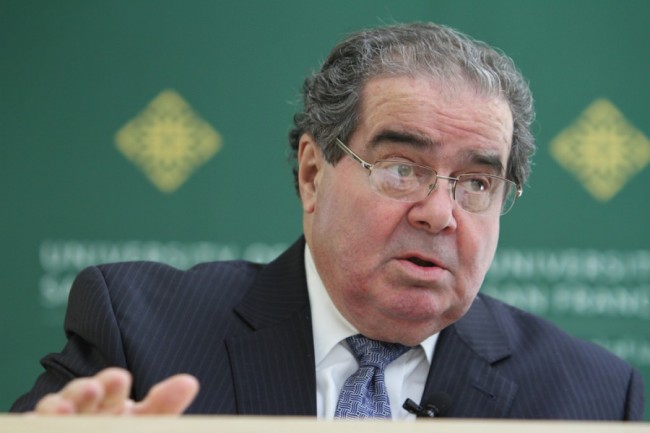Supreme Court Justice Antonin Scalia treated the SMU community to a guest lecture at the McFarlin Auditorium Monday night.
Justice Scalia was joined by Bryan Garner, the co-author of his new book, “Reading Law: The Interpretation of Legal Texts.” They broke the book down, page by page, to an audience of more than 1900 people, explaining how to interpret legal text.
Garner is a Distinguished Research SMU Law professor, as well as the editor in chief of Black’s Law Dictionary, which is widely considered the most famous book in American law.
This is the second book they authored together. Their first one, “Making Your Case: The Art of Persuading Judges” was published in 2008, with the assistance of SMU law students.
The audience included many local Dallas lawyers, SMU law students, professors and undergraduate students, here to witness another sitting Supreme Court justice speak at SMU.
Justice Ruth Bader Ginsburg spoke in 2011 and Justice Sandra Day O’Connor has spoken on campus before also.
“I am very interested in politics and law and I thought this would be a good experience to see a living piece of the government,” junior economic and finance major Stephen Boyd said.
The doors to McFarlin opened at 5:30 p.m. where lines had already extended most of the way down the sidewalk.
Some attendees either had tickets in hand or at will-call, but others like Boyd were students hoping to get any extra tickets.
Security guards were walking up and down the lines reminding guests of the rules: no bags, no cameras and no cell phones.
While the guests ranged in age, each was there to be a part of this rare experience.
“Any chance you have to see a sitting Supreme Court justice, you better jump at the chance,” Chad Ruback said. Ruback graduated from SMU Law School in 1997 and returns several times throughout the year to speak to students.
SMU students and Dallas residents alike realized that for a reasonably-priced ticket, they would be able to behold a speech from one of the most powerful men in the United States.
“If the president were at SMU and I had the chance to go for $35 I would go, and the Supreme Court Justices are the next most important people so I wanted to come and check it out,” Bradley Monk, a 2012 from SMU Dedman Law School graduate, said.
President Turner began the night by introducing the current Dean of the Dedman Law School John Attanasio, who’s position as Dean will end in May.
This is the second time that Justice Scalia has spoken at SMU in the 15 years while Attanasio has been dean.
Justice Scalia and Garner had spent the day attending a SMU Law school class, and they attended two more Tuesday.
They began the night with a reading of the preface of their book, as they explained the opposition to textualism.
Textualism is the theory or belief that the ordinary meaning of a text should help guide the way that the text is interpreted.
The two played well off of each other. They spent much of the night reading to the audience, explaining how they believe legal text should be interpreted.
They elicited laughter from the audience throughout the night and even poked fun at their differing political views.
Despite their differing views, they were able to drive home their point of textualism and how it is the most honest way to come to a decision.
“We have worked together on 700 cases together and have yet to find one we didn’t agree on,” Garner said.
In their opinions, a good judge should often come to a decision that goes against his or her personal policy.
“A judge who always likes the results he reaches is a bad judge,” Justice Scalia said as the audience began to applaud.
Garner and Justice Scalia described the book as a “restatement.” It consists of black letter text, an explanation and lots of cases as examples.
“Law schools teach common law which was wonderful 100, 200 years ago but there’s no common law anymore,” Justice Scalia said. “All law involves text now, which is one of the problems we hope this book alleviates.”
Justice Scalia also cleared up several misconceptions about himself as a Supreme Court justice.
“I am not a strict constructionist. You don’t want to be a strict constructionist. You don’t want to interpret it strictly you want to interpret it reasonably,” Justice Scalia said.
The event adjourned at 9 p.m., and the guests of honor stayed after to sign copies of their books that were for sale in the lobby of the auditorium.
This was the first lecture series in McFarlin Auditorium in 2013.
The Tate lecture series begins next Tuesday with Michael Beschloss and Douglas Brinkley.
Beschloss is a political historian and author of nine books. Brinkley is also an author and history professor at Rice University.










